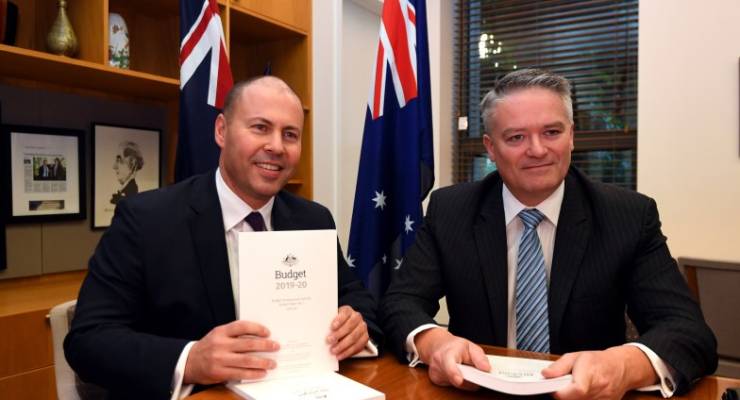
The best part of the 2019 budget, revealed tonight almost exactly three months before the financial year it is supposed to relate to, is that it illustrates how the annual fiscal setpiece now has almost nothing to do with the economy or fiscal policy and everything to do with the political needs of the government of the day.
This one is literally the start of next month’s election campaign. Tonight isn’t a “pre-election budget”, it’s the longest, most detailed campaign launch glossy in history.
For example, you can’t rely on this budget to tell you what the 2019-20 economy will be like: Treasury has a poor record of forecasting key economic indicators. To be fair, that applies to successive Treasurers as well, because they pick the forecast from the range offered by Treasury. But there’s no reason to think Treasury’s record is going to improve anytime soon: it has become markedly more politicised in recent years and has now been turned into a vast extension of the Treasurer’s office with the appointment of Liberal staffer Phil Gaetjens as Treasury Secretary.
That particularly applies to what is now the long-running ritual of the Downgrading Of The Wage Forecasts. This policy equivalent of a tea ceremony unfolds with slow elegance over many months: the Treasurer unveils wage forecasts that have been revised down from previous budgets, but which still look optimistically to the future and growth of over 3% in the out-years. Later, that forecast, too, will be downgraded at the subsequent MYEFO and then further downgraded when, like the passage of the seasons and the transience of human life, a new forecast the following year replaces it, with the same optimism for the future, delayed another year.
The ceremony teaches us the important lesson that a golden future never dies, but never arrives, either. That’s why, according to the 2016 budget, Australian workers should be enjoying 3.25% wages growth right now — a forecast that first fell to 3%, then to 2.75%, then to 2.5% in MYEFO last December. WPI growth in the year to December was 2.3%. But don’t worry, the current forecast is 3.5% growth in 2021-22.
And as we’ve seen in recent years, just because measures are announced on Budget night is no guarantee they will ever become reality: they must pass the senate. This government has presided over a novel development in fiscal policy in Australia — the creation of a new class of “zombie measures” which wander like the living dead through successive budget documents without ever being enacted due to senate opposition and eventually being dumped entirely or extensively modified. Depending on the election outcome next month, tonight’s budget is likely to have an entirely new class of measures again, ones that never even make it into the senate.
That’s on top of all the usual tricks used by both sides of politics — as we noted yesterday, years of headlines about flash national security spending packages designed to combat terrorism in fact have left the Australian Federal Police budget unmoved. Bold infrastructure announcements designed to create the impression of large investments in our physical capital turn out to be rebadgings or movements of existing spending.
It’s even hard — mainly because Treasury can’t get its revenue forecasting right — to tell exactly how stimulatory a budget will be for the economy: Labor famously abandoned its 2012-13 surplus and ended with a $19 billion deficit; Joe Hockey’s infamous 2014 budget originally forecast a $30 billion deficit that became $38 billion. As it turned out, in both cases it was the right macroeconomic call to make, but it also illustrated how what happens in May one year is very different to the reality a year later.
That 2014 budget was unusual for several reasons; one of which was the extent to which it became fixed in the public imagination as defining of the Abbott government. Voters sat up and took notice of that budget, and didn’t like what they saw. Josh Frydenberg’s task is to get voters to take notice of the government tonight in a positive way.
Beyond the theatre, though, there’s little point or purpose.








So, Frydenberg will be only the third treasurer in Australian political history to hand down a budget surplus!
Big deal!
What voters don’t seem to realise is that budget surpluses are achieved through massive cuts in government spending – almost solely from social welfare, education, health and infrastructure spending. It’s why our telecommunications, roads, education and health infrastructure are so 3rd world.
Governments fixated obsessively with budget surpluses are blind to the effects they have on people who rely on properly funded services to ease them through life.
Frydenberg can shove his lousy 75 bucks. I don’t want a pathetic handout to assuage the criminal price gouging of power companies. I want the greedy bastards bought to heel so we have lower power prices.
Wake me when it’s over.
Trying to achieve a budget surplus during a period of slowing GDP & Wages growth is a recipe for a recession, as you’re basically taking money out of an already languid economy. Also, how can it be considered a true surplus when it is so dependent on one-off, rather than concurrent-factors? From what I can see, this group have just shuffled around spending on Defence Procurement, Infrastructure & the NDIS in order to just fall across the line-& even then they’d have failed without a very good year in terms of export earnings……again, something that cannot be relied on when so many Countries are reducing their demand for our resources.
Oh, almost forgot, the surplus is also based on extremely heroic wage growth predictions.
Great. ‘A Budget built on house of cards forecasts by a “Non-core Promises Party” government trying to gull sufficient rubes to re-elect it’?
Just gimme whatever cash you’re offering, I’ll take it and vote against the LNP anyway.